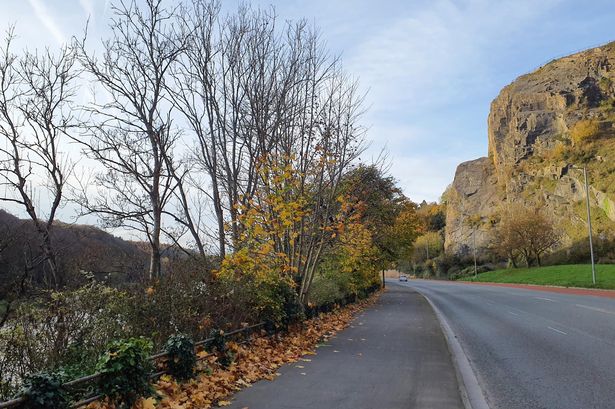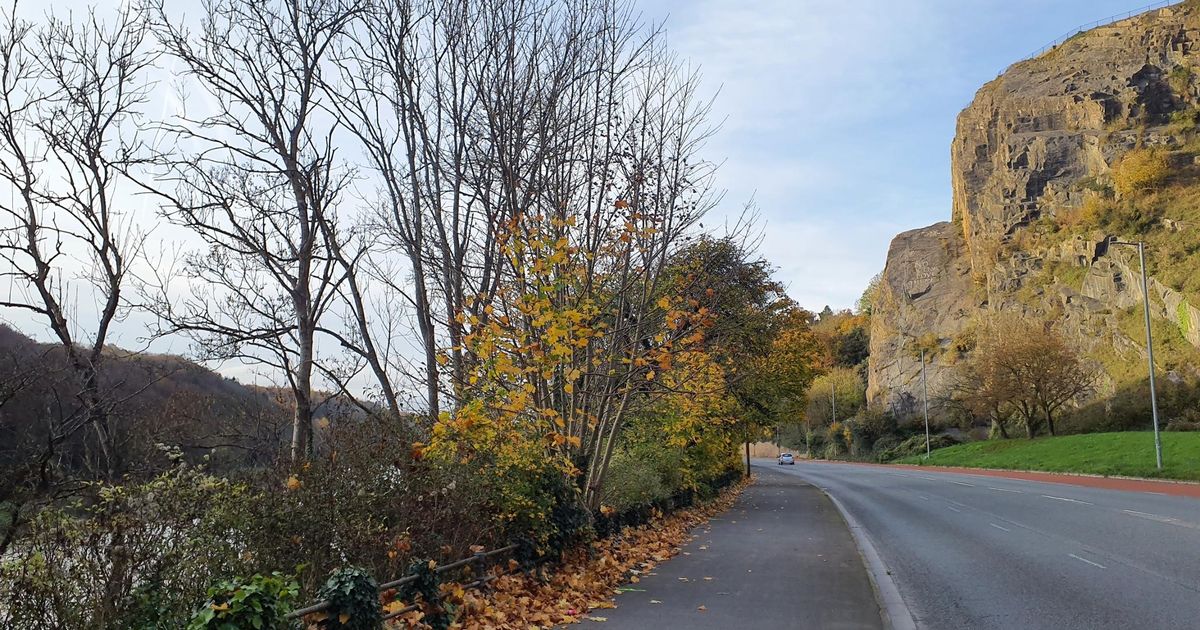Row as Bristol city councillors divided on £2.8m project Trees infected with ash dieback on the Portway, pictured in November 2024 before they were felled(Image: Bristol City Council)
Trees infected with ash dieback on the Portway, pictured in November 2024 before they were felled(Image: Bristol City Council)
Thousands of dangerous ash trees suffering from a deadly disease that pose a risk to public safety will be felled or made safe after Bristol city councillors agreed £2.8million of urgent works.
Between 3,000 and 4,000 council-owned trees in the latter stages of ash dieback, an unstoppable windblown fungus, have become brittle and could collapse at locations next to roads or properties across the city.
The public health and communities committee approved the funding over the next three years, comprising £930,000 to chop them down and £1.9million for replacement tree planting, which will eventually increase Bristol’s overall tree canopy by 10 hectares.
But a political row broke out as the committee’s three Labour members refused to support the plans and abstained, while the other three parties voted in favour.
A report to the meeting said 10,000 trees owned by the local authority were in an advanced state of decline, with about a third of those identified as requiring the most urgent work to maintain public safety.
It said there would be a “short-term” reduction in the city’s tree cover, but answering questions from Cllr Tom Blenkinsop (Labour, Avonmouth & Lawrence Weston), Bristol City Council ’s head of parks and green spaces Richard Fletcher said it would take 15 to 20 years for the amount of canopy to return to current levels.
Sign up to receive daily news updates and breaking news alerts straight to your inbox for free here.
Mr Fletcher said the trees would be lost anyway as a result of ash dieback and not because of the council’s decision to cut them down.
Cllr Blenkinsop said: “I understand what you’re saying but I’m struggling to get my head around 15 to 20 years being a temporary situation.
“I appreciate the position but I don’t think any of us are happy about these trees coming down.
“I’m a bit worried that in some areas we will be removing healthy trees because they might be at risk or that it’s expedient to do so.”
Mr Fletcher replied: “That’s part of it. We’re obviously targeting trees that are at the later stage of ash dieback because they are at the most risk.
“Because ash trees are risky to deal with for the operator, they are quite high cost to remove and have works done on them.
“The cost of dealing with ash dieback trees is proportionately much higher – about 80 per cent higher than a normal tree – so that means we might choose to proactively remove trees because they are almost certainly going to get the disease, and dealing with it all in one go.
“The long-term impact of not doing that is higher and higher costs in dealing with it.
“We can’t hide away from the fact that ash dieback is going to have an impact, albeit temporarily, on the tree canopy in the city.
“The canopy is dying back, we’re going to lose it, so it’s not going to be the effect of us removing those trees that has the impact on the canopy, that impact is happening.”
Committee chairman Cllr Stephen Williams (Lib Dem, Westbury-on-Trym & Henleaze) said: “They would come down naturally.
“The reason we are having to take this decision is that we have to have in our minds the safety of the public.
“We would be even more concerned if a branch fell on a bus, pedestrian or a cyclist.”
Cllr Ed Fraser (Green, Eastville) told the meeting: “There were similar proposals relating to ash dieback works that were brought to the former [Labour] cabinet in January 2022 but they were withdrawn because the council was unable to identify the funds necessary to implement what was needed.
“Had funding been identified by cabinet at that point more than three years ago, we could have started dealing with this issue then, and the amount of trees we’re talking about could be significantly smaller.”
Members voted 6-0, with the three abstentions, to approve the funding for the three-year programme, which is in addition to other ongoing tree-planting schemes.
Cllr Williams will write to the government to ask for money for councils to deal with the disease because it is a national problem.
He said: “While the money we’re about to approve gets us through the next few years, this problem is only going to grow and will probably outgrow the council’s ability out of its own resources to deal with it.”
Afterwards, Cllr Cara Lavan (Green, St George Central) said: “Greens support this tree-planting programme to address the huge issue presented by ash dieback.
“This plan will add 10 hectares of tree canopy to Bristol while also removing the large number of dead or dying ash trees that pose a risk to public safety.
“Local experts agree with our view that it’s a sad but necessary action.
“By refusing to support this strategy, Labour are continuing years of inaction to tackle this national problem.
“While their cabinet chose not to find money to put a strategy in place in 2022, the first budget set by this administration has put the council on sound financial footing to put this plan into action, and we are glad to hear that the chair will be writing to the government to ask for further financial support.”
Try BristolLive Premium for FREE without intrusive ads and brilliant new features
No intrusive adverts, pop-ups or distractions! Just our brilliant content presented in the best way possible.
Get your free one-month trial by visiting the ‘Premium’ tab on the BristolLive app now (auto renews annually at £19.99).
If you haven’t got it already, get started by downloading our app here on iPhone or here on Android. If you already have the app but can’t see the ‘Premium’ section, you’ll need to check for the latest update. More info here.
